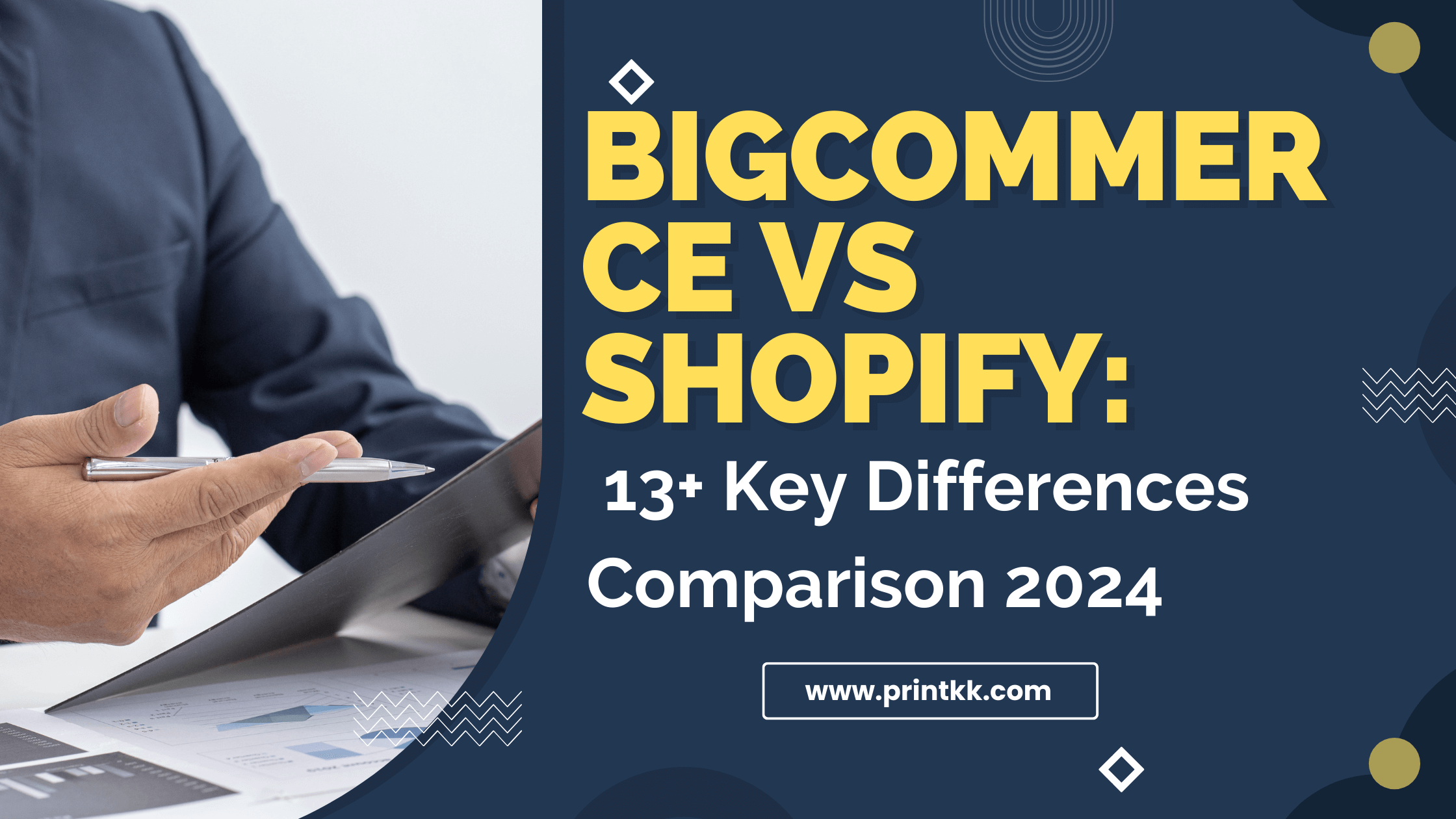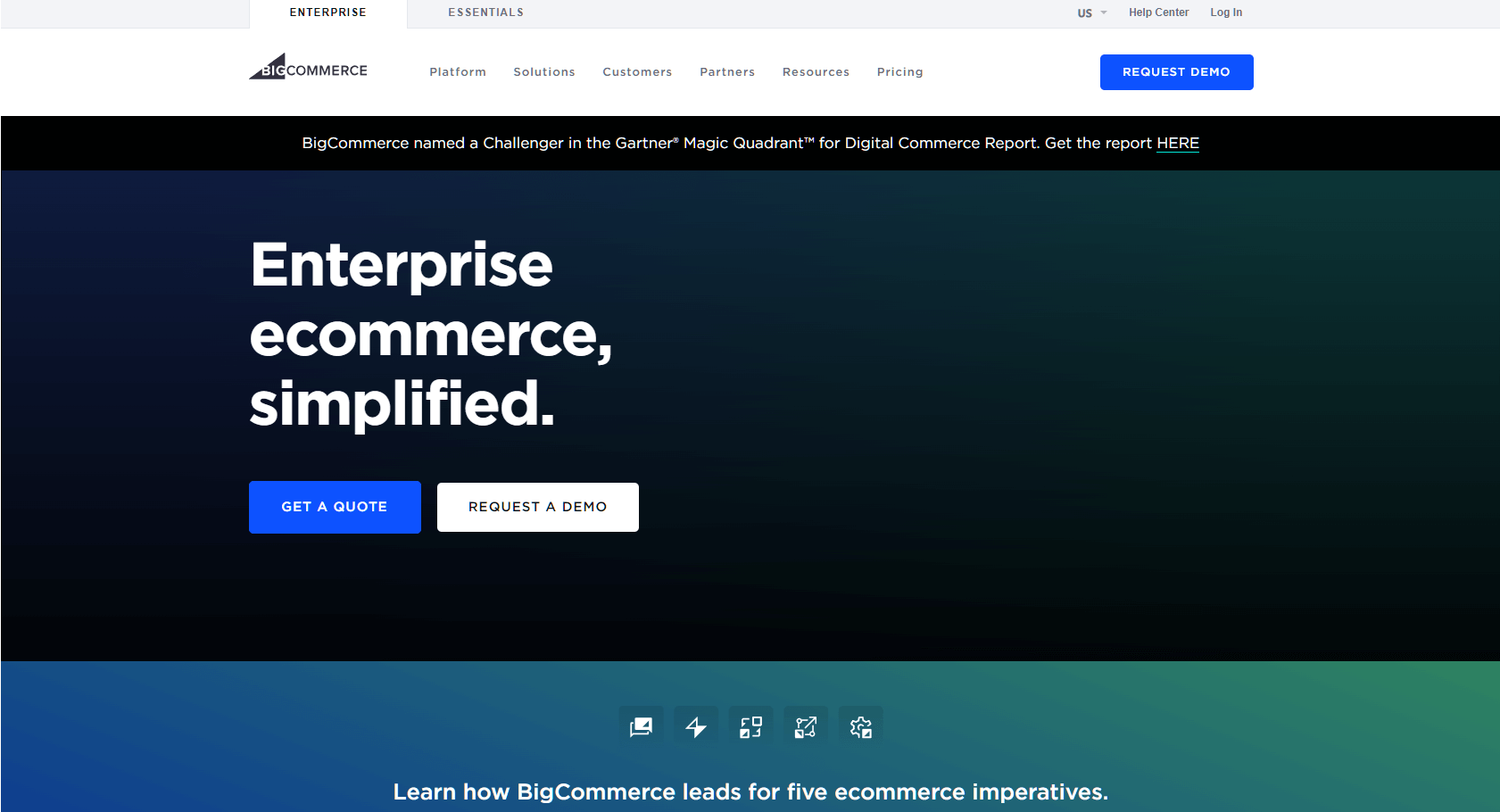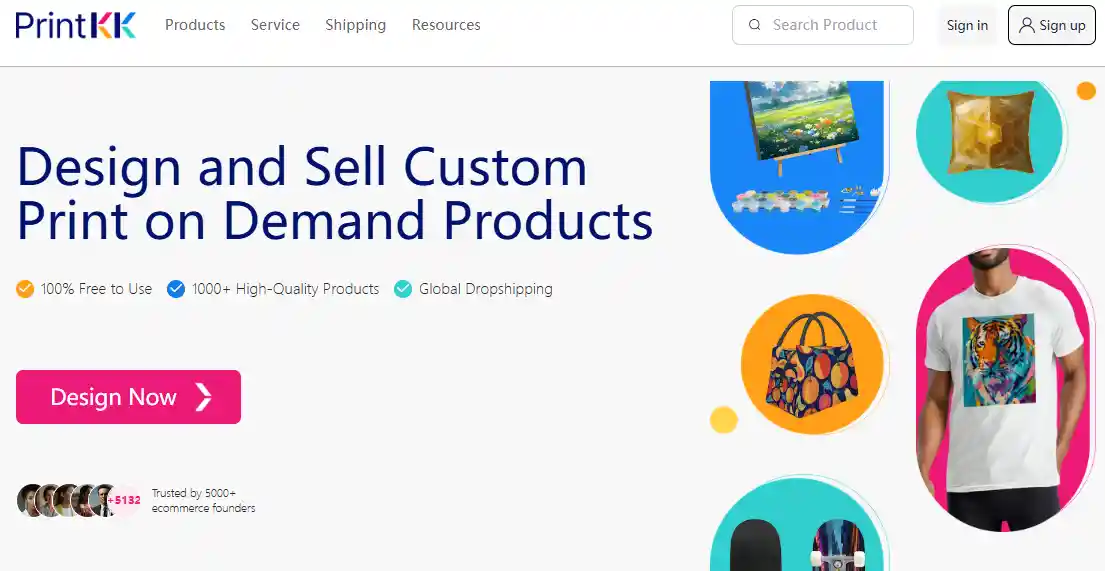
Choosing between the vast world of e-commerce can be a real headache. But don't worry, this 2025 guide, 'BigCommerce vs Shopify: 13+ Key Differences', is your compass in the digital landscape. We dive deep into both platforms, comparing features, pricing, usability, and more to unveil which might be the crown jewel for your online business. Whether you're scaling up or just starting, understanding these differences is key to unlocking your e-commerce potential.
What Is BigCommerce?

In a world where e-commerce is rapidly evolving, BigCommerce stands out as a key player, offering unique solutions for a diverse range of online entrepreneurs and businesses. So, what is BigCommerce, and why is it increasingly becoming a choice for many in the digital market space?
BigCommerce is a powerful e-commerce platform that can meet the requirements of businesses of all sizes. It caters to a wide spectrum of users, from budding entrepreneurs and small businesses to well-established brands and large-scale organizations. The platform is renowned for its ability to scale alongside your business, making it a viable option for businesses poised for growth. BigCommerce simplifies the setup of online stores and allows users to easily create and manage their stores through a user-friendly interface.
What sets BigCommerce apart is its emphasis on providing an all-inclusive e-commerce solution. It features extensive built-in sales tools, advanced SEO capabilities, and a wide array of customizable templates to cater to the unique needs of various industries. Additionally, BigCommerce boasts a strong integration ecosystem, seamlessly connecting with various applications and services. This integration capability extends the platform's functionality, ensuring that businesses can easily adapt to changing market trends and consumer demands. Whether you are a designer eager to showcase your portfolio, a dropshipper looking for a reliable platform, or a corporation aiming to streamline your online sales, BigCommerce offers the tools and flexibility required to thrive in the digital marketplace.
Pros and Cons of BigCommerce
When considering BigCommerce as an e-commerce solution, it's essential to understand its advantages and potential limitations. This balanced view is crucial for businesses making an informed decision.
Pros of BigCommerce
BigCommerce's most significant advantage lies in its scalability. It's designed to support and grow with businesses, making it an ideal platform for entrepreneurs planning for long-term expansion. This scalability ensures that the platform remains suitable as business needs evolve.
BigCommerce's built-in capabilities are also a key benefit. This platform has comprehensive SEO and marketing tools to help you run your online store better. These features are particularly beneficial for small businesses with fewer resources.
The absence of transaction fees is another obvious benefit of BigCommerce. No matter what payment method you choose, BigCommerce does not charge additional transaction fees. This form can significantly reduce costs and encourage sales, allowing sellers to capture more profits.
Cons of BigCommerce
On the downside, BigCommerce's pricing structure can be a potential hurdle. The platform is rich in features, but you need to pay extra for those features. BigCommerce's more expensive payment amounts relative to other platforms can be a challenge for small businesses.
Another drawback is the learning curve associated with the platform's customization capabilities. Despite offering a variety of customizable templates, some users find these less intuitive than those on other platforms. This can present a challenge for individuals lacking technical expertise.
Lastly, limitations in BigCommerce's international selling capabilities have been a point of concern for some users. For businesses aiming to expand globally, these limitations could impact their ability to reach international markets effectively.
In summary, while BigCommerce offers robust features and scalability, it's crucial to consider its higher cost, the learning curve for customization, and its potential limitations in international selling. These factors are particularly significant for businesses with specific budgetary constraints or technical skill levels.
What Is Shopify?

In this exploration, we delve into Shopify – a name that resonates with entrepreneurs, designers, brands, and organizations alike. Let's take a look at what Shopify really is.
Shopify is a full-fledged e-commerce platform where both individuals and businesses can create their own online stores. It's a comprehensive tool that blends ease of use with a robust set of features, making it a go-to choice for a wide range of sellers. From artists selling their creations to large corporations managing a vast inventory, Shopify's versatility is its standout feature. Its easy-to-use interface allows beginners to quickly get started and set up an online store.
Moreover, Shopify is not just a storefront; it's a complete ecosystem. It offers integrated payment processing, known as Shopify Payments, eliminating the hassle of setting up a third-party payment gateway. The platform also provides a range of marketing tools and analytics to help businesses understand their customers and grow their audience. With its scalable architecture, Shopify can grow with your business, ensuring that your online presence is strong and adaptable in the ever-evolving digital landscape. Whether you're a solo entrepreneur or part of a larger organization, Shopify provides the tools and flexibility to meet your e-commerce needs.
Pros and Cons of Shopify
Among the many e-commerce platforms, Shopify is a strong competitor. For entrepreneurs, small business owners, and a wide range of online retailers, understanding Shopify's advantages and drawbacks is essential for making an informed choice.
Pros of Shopify
Shopify's primary strength lies in its user-friendliness. The ease of use and intuitiveness of the platform is reflected in all aspects. Not only can beginners quickly learn how to open a store, but enterprises can also greatly reduce the operation of the store to improve operational efficiency.
Shopify has a comprehensive ecosystem that offers a wide range of design themes and applications. Users can customize the store according to their own ideas and increase the features of the store. This flexibility is ideal for businesses that wish to tailor their online presence to fit their brand identity and operational needs.
Moreover, Shopify is well-known for its robust support system. Shopify has 24-hour customer support, ready to help you with any questions. The platform also has a large community of experts and resources to guide you on how to run your business successfully.
Cons of Shopify
However, Shopify has its limitations. One of the primary concerns is the additional costs associated with its extensive app ecosystem. While the platform itself is reasonably priced, the costs can add up when integrating multiple paid apps to extend functionality. This aspect can be a budgetary concern, especially for startups or small businesses with tight financial constraints.
Shopify's transaction fees are another drawback. There are additional transaction fees if you use a payment method other than Shopify Payments. Such transaction fees can be a challenging cost for large businesses with high volume of sales.
Lastly, while Shopify offers a range of customization options, there's a limitation to the extent of customization available on the platform, especially if one does not have advanced technical skills or the budget to hire a developer.
In conclusion, Shopify's user-friendliness, comprehensive ecosystem, and robust support make it an attractive option for many businesses. However, its additional costs, transaction fees, and customization limitations are factors to consider, particularly for businesses with specific budgetary or customization requirements.
Detailed Comparison of BigCommerce and Shopify
When navigating the choices in the e-commerce platform market, a detailed comparison between BigCommerce and Shopify is essential for entrepreneurs, small business owners, and various online merchants.
Pricing Plans
BigCommerce has multiple payment plans. Enterprises of different sizes can make corresponding choices. Shopify also provides a range of plans, including a basic option for startups.
Transaction Fees
Shopify charges transaction fees for any payment that is not processed through Shopify Payments. Regardless of which payment gateway you use, BigCommerce does not charge transaction fees.
Customizability
Shopify offers extensive customization options through its themes and apps. BigCommerce also allows significant customization but requires more technical expertise for advanced changes.
Usability
Shopify is celebrated for its user-friendly interface, ideal for beginners. BigCommerce offers a more feature-rich interface, which might have a steeper learning curve.
Platform Themes
Shopify has a large number of paid or free aesthetic themes that are very compelling. BigCommerce also offers a variety of themes, with a focus on functionality.
Selling Tools
Both platforms provide a suite of selling tools, but Shopify has an edge with its integrated POS system and better third-party app integrations.
SEO
Shopify and BigCommerce offer robust SEO features. Shopify's ease of use makes it preferable for SEO beginners, while BigCommerce offers more advanced SEO tools.
Customer Support
Shopify has 24-hour customer support and a large community forum. BigCommerce also offers excellent support, with additional resources like webinars and community groups.
Integrations and Apps
Shopify is praised for its vast app marketplace, which includes apps for a wide range of business needs, including specialized ones like print-on-demand businesses. BigCommerce also has a comprehensive app store, but the emphasis is on the built-in integrations it offers, rather than the breadth of third-party apps.

Dropshipping
Shopify and BigCommerce both support dropshipping, with Shopify offering better integration with popular dropshipping apps like Oberlo.
Which One Is Better: Shopify or BigCommerce?
In the competitive world of e-commerce platforms, choosing between Shopify and BigCommerce is a pivotal decision for entrepreneurs, designers, and businesses. Let's consider the most critical details.
- Ease of Use
Shopify is known for its user-friendly interface, making it a preferred choice for those new to e-commerce. BigCommerce, while feature-rich, may have a steeper learning curve.
- Customization and Design
Shopify offers a wide range of customizable themes and apps, catering to businesses that prioritize design aesthetics. BigCommerce also provides customization options but with a focus on functionality.
- Pricing and Value for Money
Shopify and BigCommerce offer different pricing tiers. The decision here depends on the specific needs of the business and the value derived from each platform's features.
- Integrations and Apps
Shopify leads with a vast array of apps in its marketplace, enhancing functionality. BigCommerce also has an extensive range of integrations, focusing more on essential built-in features.
- SEO Capabilities
Both platforms offer strong SEO tools, but BigCommerce has advanced features for those with specific SEO needs.
- Customer Support
Shopify and BigCommerce both offer reliable customer support, but Shopify's 24/7 availability is a plus for businesses needing round-the-clock assistance.
- Sales Tools and Features
Both platforms offer a suite of sales tools, but Shopify has an edge with its integrated POS system and diverse third-party app integrations.
- Dropshipping Capabilities
Shopify and BigCommerce support dropshipping, but Shopify provides better integration with popular dropshipping apps.
Ultimately, the choice between Shopify and BigCommerce hinges on the specific needs, technical proficiency, and long-term goals of the business. Each platform has its strengths, and the best choice varies based on individual business requirements.
Conclusion
The final choice between BigCommerce and Shopify needs to be based on your business goals. Shopify excels in user-friendliness and design flexibility, ideal for those new to e-commerce or prioritizing aesthetics. Its extensive app market caters to diverse functional needs.
BigCommerce, on the other hand, offers robust built-in features and scalability, suitable for businesses eyeing growth without the burden of transaction fees. Its technical robustness caters well to those with some technical expertise.
Ultimately, your choice depends on prioritizing ease of use and design (Shopify) or advanced features and scalability (BigCommerce). Both platforms offer unique advantages, and the right choice varies based on individual business requirements and growth strategies.
FAQs
Should I switch from BigCommerce to Shopify?
Deciding to switch from BigCommerce to Shopify depends on your business needs. Shopify is for people who are new and focused on design. However, if your priority is robust built-in features and scalability without extra fees, BigCommerce may be better. Consider your growth plans and feature requirements carefully, as switching involves migration efforts.
Is BigCommerce cheaper than Shopify?
Comparing BigCommerce and Shopify in terms of cost, BigCommerce typically has a higher initial price but includes more built-in features, potentially saving on extra app costs. Shopify, initially more affordable, can become pricier with added apps for functionality. Choose BigCommerce for more features at a fixed cost or Shopify for a lower start-up cost with scalable options. The final decision needs to take into account the needs of your business development.
Is BigCommerce worth it?
BigCommerce is worth considering for businesses seeking scalability and advanced features without relying on many third-party apps. Its higher initial cost is offset by comprehensive built-in functionalities, making it suitable for mid-sized to larger businesses or those with specific e-commerce needs. If your priority is growth and extensive features, BigCommerce could be a strategic choice.
Who should use BigCommerce?
BigCommerce is ideal for mid-sized to larger businesses focused on growth, requiring advanced e-commerce features like multi-channel selling and extensive product catalogs. It's well-suited for those needing robust built-in functionalities, minimizing the reliance on third-party apps. This makes it a strong choice for enterprises with specific, complex e-commerce needs.










 Global Shipping
Global Shipping




 Made in USA
Made in USA
























